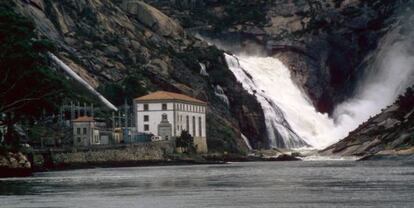€8.5 million bond for firm that dried up a unique waterfall in Galicia
Hydroelectricity company Ferroatlántica benefited from a decision by a regional official

Prosecutors want a former Galician government official to serve a year and a half in prison for environmental crimes, after he allowed a company to dry up a unique waterfall – the only one in all of Europe that delivers its water directly into the sea.
The firm, Ferroatlántica, has been slapped with a €8.52 billion bond by the judge investigating the case in Santiago de Compostela.
Between 2004 and 2011 this company, which operates a dam upstream from the Ézaro cascade, on the Xallas River, interrupted the natural water flow to increase its own hydroelectricity output.
This is not the first time that Ferroatlántica has been involved in a natural disaster in the area of Xallas
The waterfall was dry at all times except for one hour each weekday and all day on weekends between June and September, when tourists were more likely to visit the site.
Ferroatlántica belongs to the Villar Mir Group, whose founder, Juan Miguel Villar Mir, was a treasury minister in the early days of Spanish democracy and earned the title of marquis in 2011.
The company is hoping it will ultimately not have to pay the bond in the case against Francisco Pan-Montojo, ex-director general of Quality and Environmental Assessment for the regional government of Galicia, which is governed by the conservative Popular Party (PP).
On March 22, 2001, Pan-Montojo allowed Ferroatlántica to suspend the natural flow of water and replace it with a “touristic” flow of sorts, a situation that is not contemplated in regional legislation. Galicia’s fishing laws say that hydroelectricity dams must at all times respect the necessary ecological water flow to allow fish populations to develop normally.
Prosecutors have found that the alteration to the water course “has produced significant effects on the river and its associated ecosystems”
Ferroatlántica operates Santa Uxía Dam, located near the Ézaro waterfall, a spectacular natural landmark located in the municipality of Dumbría (A Coruña). For years, the cascade was dry in order to favor Villar Mir’s business. The water was instead diverted into the sea through parallel pipes.
Prosecutors find that the Galician government official allowed the company to reduce the water flow “in full knowledge of its illegal nature and without respecting the most elemental administrative rules.”
EL PAÍS was unable to reach Pan-Montojo for comment.
The written accusation holds that the fact that the last 1,200 meters of the Xallas’ course barely had any water “has produced significant effects on the river and its associated ecosystems.”
In March 2011, pressure from green groups made the Galician government backtrack on its permission to dry up the waterfall. Ferroatlántica now has to let 10 percent of the natural water flow through. The company claimed €57.2 million in damages.
But prosecutors now feel that the company participated for profit in the crime, and owes the regional government the €6.39 million that it made between 2004 and 2011. No date has been set yet for the trial.
This is not the first time that Ferroatlántica has been involved in a natural disaster in the area of Xallas. In 2011, the company admitted that its decision to dry up a reservoir to maximize electricity production led to the death of 15,000 fish.
Tu suscripción se está usando en otro dispositivo
¿Quieres añadir otro usuario a tu suscripción?
Si continúas leyendo en este dispositivo, no se podrá leer en el otro.
FlechaTu suscripción se está usando en otro dispositivo y solo puedes acceder a EL PAÍS desde un dispositivo a la vez.
Si quieres compartir tu cuenta, cambia tu suscripción a la modalidad Premium, así podrás añadir otro usuario. Cada uno accederá con su propia cuenta de email, lo que os permitirá personalizar vuestra experiencia en EL PAÍS.
¿Tienes una suscripción de empresa? Accede aquí para contratar más cuentas.
En el caso de no saber quién está usando tu cuenta, te recomendamos cambiar tu contraseña aquí.
Si decides continuar compartiendo tu cuenta, este mensaje se mostrará en tu dispositivo y en el de la otra persona que está usando tu cuenta de forma indefinida, afectando a tu experiencia de lectura. Puedes consultar aquí los términos y condiciones de la suscripción digital.








































